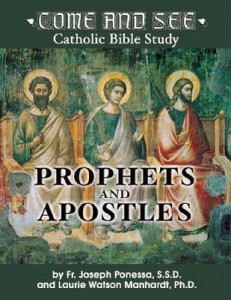Book Review: Prophets and Apostles by Joseph Ponessa & Laurie Watson Manhardt
Disclaimers: I received this book in a Goodreads giveaway on the premise that I would read and review it. I am a Christian, but not a Catholic, which influences my reaction to this volume.
 This volume is part of the “Come and See” Bible study series; I have previously reviewed the “Acts and Letters” volume and you may wish to look that up. It’s important to remember that this is not a stand-alone book. For full value, you will need to have a Catholic translation of the Bible with all the books (in particular Baruch and Daniel) and a copy of the most recent revision of the Catholic Catechism. It’s also meant to be used not individually, but in the context of a small Bible study group, meeting regularly and advised by a priest or elder.
This volume is part of the “Come and See” Bible study series; I have previously reviewed the “Acts and Letters” volume and you may wish to look that up. It’s important to remember that this is not a stand-alone book. For full value, you will need to have a Catholic translation of the Bible with all the books (in particular Baruch and Daniel) and a copy of the most recent revision of the Catholic Catechism. It’s also meant to be used not individually, but in the context of a small Bible study group, meeting regularly and advised by a priest or elder.
This volume, Prophets and Apostles, concerns itself with the so-called “minor” prophets, and the shorter apostolic letters. The primary theme is that the prophets point the way to the ministry of Jesus and the redemptive power of His sacrifice, while the apostles explain how the prophecy was fulfilled in Jesus and give advice for going forward in the life of the church.
As there isn’t a separate “leader’s guide”, this book begins with a chapter on how to set up the Bible study group and keep it running, which is very similar to the one in Acts and Letters.
The text switches back and forth between Old and New Testament, keeping the material fresh. Each chapter covers a book or two, or a large section of a book, discussing the salient points the author of this volume wants to point up. A selection of questions and suggestions for group discussion follow each chapter. There are frequent quotations from Catholic scholars, in particular the previous two Popes.
The text shows the author’s Biblical scholarship, and also a strong adherence to Catholic dogma. The writer’s a bit more personally visible in this volume than in Acts and Letters. Great care is taken to show that the Bible does not contradict itself, even when verses taken out of context would seem to do so.
One nitpick here–In discussing Galatians 4:4-7, the author makes the claim that “sons” is inclusive language, while “children” is exclusive. This seems to be based on the Greek word Paul uses, direct translation “sonship” having special meaning above and beyond ordinary adoption. But such would not be obvious to the lay reader, who is more likely to come to the conclusion that Paul was simply using the pre-Twentieth Century practice of using masculine nouns and pronouns as the generic, on the assumption that male is normative, with the subtle damage that does to communication. The author doesn’t make his case well, and thus comes across as blinkered by his patriarchal training.
Overall, while I do not agree with all the interpretations of Scripture herein, nor the conclusions drawn therefrom, it’s well-written and I believe would serve a Catholic Bible study group well.
“These are the things that you shall do: Speak the truth to one another, render in your gates judgments that are true and make for peace, do not devise evil in your hearts against one another, and love no false oath.”–Zechariah 8:16-17
